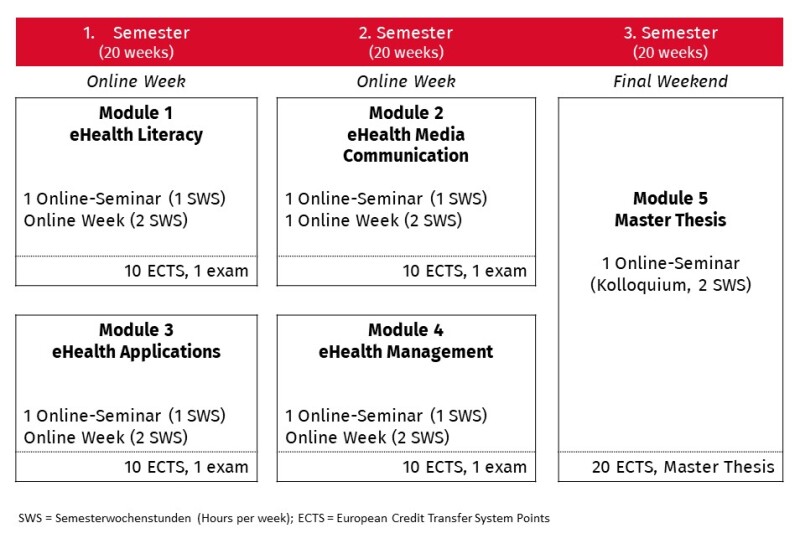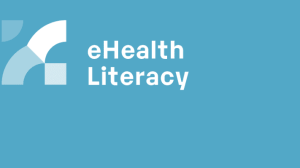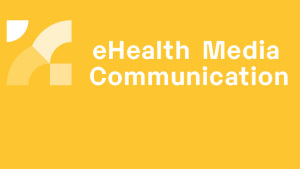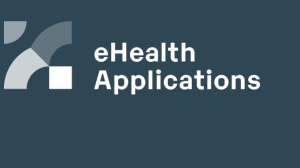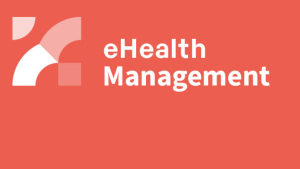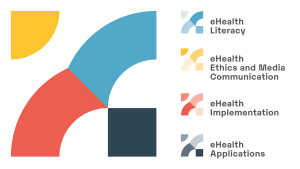
-
Module 1: eHealth Literacy
eHealth Literacy logo with blue background
Graphic: René MeyerShort Facts:
- Module Supervisor: Prof. Dr. med. Jutta Hübner
- Duration: 1 semester (usually 1. Semester)
- Units: 6 Online-Seminars (3h each) + corresponding self-study
- Form of examination: usally Online-Pitch
The module teaches basics, fundamental concepts, models and definitions of literacy, eHealth and eHealth Literacy as well as their significance for information and communication with various communication partners. Influencing factors as well as their requirements for patient empowerment and shared decision making are discussed. Students will learn about different strategies to support communication with persons with low eHealth literacy. The importance of eHealth literacy in one's own information seeking behavior and in communication with different communication partners will be critically analyzed. Settings discussed include clinics, practices, associations, health insurance companies, universities, media, and other non-profit and for-profit organizations. The benefits in the context of science and research are also explored, e.g. in data management and Big Data.
-
Module 2: eHealth Media Communication
eHealth Communication yellow background
Graphic: René MeyerShort Facts:
- Module Supervisor: Prof. Dr. Georg Ruhrmann
- Duration: 1 semester (usually 2. Semester)
- Units: 6 Online-Seminars (3h each) + corresponding self-study
- Form of Examination: usally online exam
The module provides an in-depth insight into health communication and eHealth communication, in particular communication with the media and the public. Students gain insights into risk and crisis reporting, as well as medical journalism and eHealth campaigning. Changes in communication and their significance in the digital public sphere are analyzed, e.g. how to deal with controversial topics or how to present (scientific) content in a way that is appropriate for the target group. Also discussed is the fine line between everyday knowledge and evidence-based knowledge, as well as relevant actors and eHealth as a means of networking. The concepts of medical ethics are also introduced and reflected upon in terms of their significance for eHealth applications and their use in communication. Differences between profit and non-profit organizations will be examined and discussed. The online week will provide initial grounding and an introduction to the module. The necessary theoretical basics are prepared by the students themselves with the help of prepared online material. The focus of the online seminars is on practical exercises based on concrete case studies in different settings. These case studies are worked on by the students in advance as part of the self-study.
-
Module 3: eHealth Applications
eHealth Applications grey background
Graphic: René MeyerShort Facts:
- Module Supervisor: Prof. Dr. Cord Spreckelsen
- Duration: 1 semester (usually 1. Semester)
- Units: 6 Online-Seminars (3h each) + corresponding self-study
- Form of examination: usally essay + online exam
The module provides an overview of various concrete eHealth technologies and current national and international developments. Technical foundations and possibilities of various eHealth applications and their possible uses are discussed, including networks (centralized, decentralized - blockchain), data management, telemedicine, health apps, information systems, forums, chats and social media. Current and future networks will be critically examined with regard to different organizational forms (e.g., differences between clinics, practices, health insurance companies, and other non-profit and for-profit organizations) and possible areas of application for eHealth applications will be discussed. The online week will provide initial grounding and an introduction to the module. The necessary theoretical basics are prepared by the students themselves with the help of prepared online material. The focus of the online seminars is on discussions and collaborative analyses of concrete case studies in different settings. These case studies are worked on by the students in advance as part of the self-study.
-
Module 4: eHealth Management
eHealth Management red background
Graphic: René MeyerShort Facts:
- Module Supervisor: Prof. Dr. Erwin Selg
- Duration: 1 semester (usually 2. Semester)
- Units: 6 Online-Seminare (3h each) + corresponding self-study
- For of examination: usally Online-Pitch
The module teaches knowledge about the structures of the German healthcare system, especially with regard to eHealth applications. The aim is to prepare students for the potential implementation of eHealth applications in different professional settings. Key milestones of implementation are analyzed and discussed, including the market supply for eHealth applications in the context of demand and competition analyses, the preparation and assessment of business plans and project outlines, external quality assurance and internal quality management, and the role of corporate communication and culture. The online week will provide initial grounding and an introduction to the module. The necessary theoretical basics are prepared by the students themselves with the help of prepared online material. The focus of the online seminars is on practical exercises based on concrete case studies in different settings. These case studies are worked on by the students in advance as part of the self-study.
-
Module 5: Master Thesis
Module logos
Graphic: René MeyerShort Facts:
- Module Supervisor: Prof. Dr. med. Jutta Hübner
- Duration: 1 semester (usually 3. Semester)
- Units: zeitlich flexible Online-Seminare (Kolloquium)
- Form of Examination: Master Thesis
Writing of a Master's thesis accompanied by an online colloquium integrating all learned contents of the other modules and their application to an concrete complex and interdisciplinary problem.
The English version of the examination and study regulations is not legally binding and is provided for translation purposes only.
